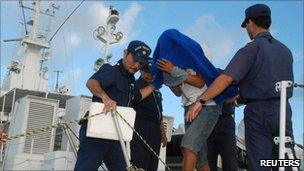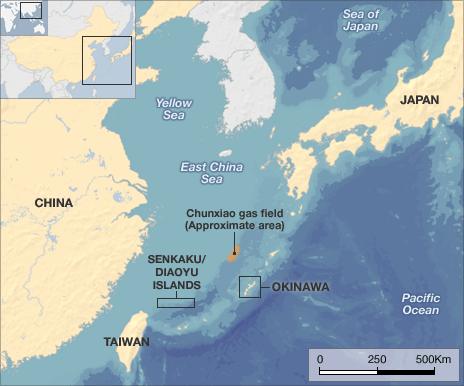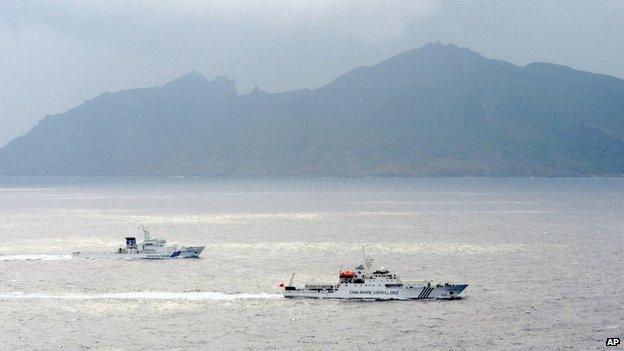China-Japan row reveals deep-seated differences
- Published

Chinese sea captain, Zhan Qixiong, remains in custody and could be prosecuted
China and Japan are currently embroiled in the most serious diplomatic row they have had in several years.
And with the captain of a Chinese fishing boat still in detention in Japan, the dispute could get even worse.
Although the issue itself seems minor, it reveals deep-seated differences between these two East Asian neighbours.
Some experts see it as a watershed moment; a shift in the balance of power as one nation becomes more powerful and the other declines.
The row began on 7 September when a Chinese trawler collided with two Japanese coastguard vessels off a series of disputed islands in the East China Sea.
These uninhabited isles - known as Diaoyu in China and Senkaku in Japan - are controlled by Tokyo, but claimed by Beijing.
After the collision, Japan took the trawler and its crew into detention.
The fishing boat and 14 crew members were released last week, but the captain, Zhan Qixiong, remains in custody. He could be charged.
Hard-line nationalism
While there have been disputes over these islands before, some experts blame Japan for this particular incident.
"Japan has changed the rules of the game. It used to just expel boats from the area, but now it has detained the captain," said Professor Jin Canrong, of the People's University of China in Beijing.
China has demanded the captain's immediate and unconditional release, calling his detention "illegal".
A fiercely nationalistic population at home will make it hard for Beijing to step down from this demand, said Prof Jin.
"There is a ridiculous perception in the West that China is a unified society. It's not - there are many different opinions," he said.
"But on this issue, a diversified society is unified, which puts our government in a very difficult position."
It is not difficult to find evidence of this hard-line Chinese nationalism - internet chatrooms are full of anti-Japanese comments.
"Strongly oppose Japan! Let's start by boycotting Japanese products and let's act now!" was just one posting.
The Chinese government has itself stoked some of this sentiment by nurturing its people's sense of grievance.
"The entire Chinese people and compatriots both at home and abroad have condemned Japan's illegal acts with one voice," read one statement from the Chinese foreign ministry last week.
"[This] fully embodies the firm will and resolve of the Chinese government and people to defend their territory and sovereignty."
An article published by China's state-run Xinhua news agency a few days ago would have done little to calm this growing anger at Japan.
It reported comments made by one released crew member, who said that after the fishermen had been detained they had to sleep sitting up and drank unclean water.
Xinhua also said the captain's grandmother had "died from shock upon learning of the detention".
Chinese assertiveness
Beijing seems willing to encourage public anger only to a certain extent though.
There have been small street demonstrations, but the central government does not appear to want bigger protests.
There are scores of Chinese security personnel stationed around the Japanese embassy in Beijing to discourage large gatherings.
There are people, however, who see this incident as the result of Chinese, not Japanese, assertiveness.
Earlier this year China seemed to indicate that the South China Sea, over which China and a number of other countries claim sovereignty, was one of its "core interests".
Many nations in East Asia saw this as the region's rising power flexing its muscles.
The Chinese trawler's detention could be seen as one of those countries pushing back.
"This is just one incident, but it is based on the accumulation of many ideas and concerns of China's neighbouring countries," said Professor Ting Wai, of Hong Kong's Baptist University.
So how will it all end? The key to solving this crisis, as China keeps repeating, is the captain, whose detention has been extended until 29 September.
If he is released next week, this could immediately ease tensions. But there is another possibility.
"If the Japanese start to prosecute the captain then there will be serious consequences," said Prof Jin Canrong.

- Published8 September 2010
- Published17 September 2010
- Published10 November 2014
